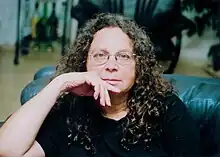Erella Shadmi
Erella Shadmi (Hebrew: אראלה שדמי) is an Israeli sociologist and peace activist. She previously worked for two decades for the Israel Police.

Career
Shadmi was born in Tel Aviv.[1] Whilst at school she attended left-wing demonstrations and became a peace activist. She then studied communications at university.[1] Despite her activism giving her a critical attitude towards the Israel Police, she decided to join in 1970 and rose to the position of colonel.[1][2] In an interview with Al-Monitor, she criticised the sexual inequalities she experienced and credited two commissioners (Herzl Shafir and Shaul Rosolio) for their respect of women.[1] She also commented in a book chapter that the police force could tolerate her pregnancy but not her lesbianism.[3] In 1996, she co-edited a history of the police force.[2]
After two decades in the police, Shadmi left and became a sociologist heading the Women and Gender Studies department at Beit Berl College.[1] She co-edited books on Israeli lesbianism and Women in Black.[2] She studied how Israel's Zionist and patriarchal society does not tolerate lesbians.[4] She also resumed her peace activism, joining Women in Black and Ahoti – for Women in Israel.[1][5] In 2012, Shadmi published Fortified land: Police and policing in Israel, which documents how the police contributes to the formation of Israeli nationhood by enforcing hegemony and targeting minority groups such as anarchists, left-wing demonstrators, poor people and Russians.[6]
Selected works
- Shadmi, Erella (2012). Fortified land: Police and policing in Israel.
- Shadmi, Erella (1993). "Female police officers in Israel: Patterns of integration and discrimination". Feminist Issues. 13 (2): 23–45. doi:10.1007/BF02685733. S2CID 144492192.
References
- Eldar, Akiva (9 March 2015). "Does Israel's police have a problem with women?". Al-monitor. Archived from the original on 28 January 2022. Retrieved 12 April 2023.
- Friedmann, Robert R. (2012). Crime and Criminal Justice in Israel: Assessing the Knowledge Base toward the Twenty-First Century. State University of New York Press. p. 421. ISBN 978-1-4384-0339-7. Archived from the original on 13 April 2023. Retrieved 12 April 2023.
- Karniel, Gal (5 September 2003). "Women of Action". Haaretz. Archived from the original on 13 April 2023. Retrieved 12 April 2023.
- Silberstein, Laurence Jay (2008). "Reading Postzionism - An Introduction". In Silberstein, Laurence Jay (ed.). Postzionism: A Reader. Rutgers University Press. ISBN 978-0-8135-4347-5. Archived from the original on 13 April 2023. Retrieved 12 April 2023.
- "Women in Black in Israel – History". Gilas Virsky. Archived from the original on 23 July 2022. Retrieved 12 April 2023.
- Litmanovitz, Yael D. (2016). Moving towards an evidence-base of democratic police training: The development and evaluation of a complex social intervention in the Israeli border police. University of Oxford. pp. 120–121. Archived from the original on 13 April 2023. Retrieved 12 April 2023.